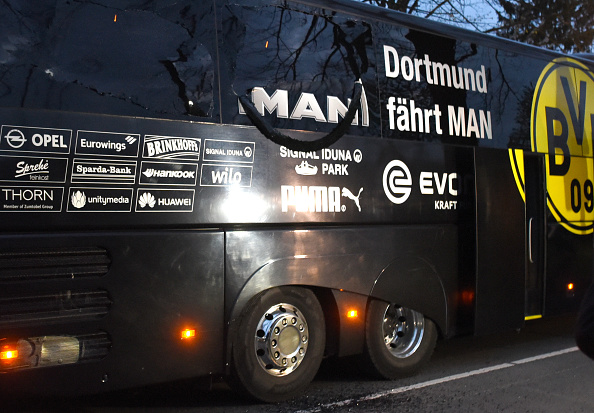It seems the rush to blame the Borussia Dortmund bus bombing on Islamist extremists was wrong. German police have now arrested a 28 year-old man in connection with the incident; and despite initial assumptions that this assault was the work of Islamic terrorists, it appears this latest suspect has no connection with Islamic State.
A week ago, it all seemed fairly straightforward: a letter had been found at the crime scene, claiming the attack had been carried out on behalf of Islamic State, and an Iraqi living in Germany had been detained by the police. The German prosecutor’s office said this man was a member of Isis, that he’d entered Germany last year, via Turkey, after leading an Isis commando unit in Iraq, and that he was still in touch with other members of Islamic state. So far, so predictable. Yet prosecutors warned they’d yet to establish a direct link between this man and the Dortmund bus bombing, and today’s arrest sends the investigation off on an entirely different course.
The latest suspect has dual German and Russian nationality, and police are now exploring the possibility that the motive for this attack wasn’t ideological but financial. The suspect allegedly bought short options in 15,000 Borussia Dortmund shares, at a cost of €78,000 (£65,000): the more the football club’s share price fell, the more money he stood to gain.
As you’d expect, Borussia Dortmund’s share price fell after the attack, from €5.74 to €5.42 (£4.80 to £4.53). It fell again, to €5.395 (£4.51), after the team was knocked out of the Champions League by Monaco last Wednesday. If a player had been maimed or murdered, the share price surely would have fallen even more. Thankfully, the only injured player (Spanish international, Marc Bartra) is recovering. Yet although a mere football match pales into insignificance in situations like this, it still feels like a cruel injustice that Borussia Dortmund’s footballers were robbed of the opportunity to do their best. They might have lost anyway, of course, but now we’ll never know. The Monaco fans and players all rose to the occasion, but, win or lose, no result would have felt right – and to cancel the match would have been even worse. At its best, a football field is a place protected from the wider world. When the wider world intrudes like this, it feels like an obscene aberration.
So what can we learn from this development? Firstly, we should resist the temptation to rush to judgement. Many people believe that Angela Merkel’s decision to let so many refugees into Germany was reckless and irresponsible. Personally, I believe she had little choice, but it’s a legitimate point of view. What’s not legitimate is to indulge in wild speculation straight after every terrorist attack. There’s often a whiff of ‘I told you so’ among some members of the commentariat that comes perilously close to schadenfreude.
Subsequent events in Paris have proved – as if any further proof were needed – that there will be more attacks on Western democracy in the months and years to come. Some of these attacks will confirm the thesis that Europe has been imperilled by recent immigration from Islamic countries. Others will refute it. Yet whatever differences of opinion we in the west may have about immigration policy, we are where we are – and where we are right now is on the same side in the battle between democracy and violence.
The other lesson to be learned from Dortmund is that it’s not only Islamists who will try and gain from terrorism. In the aftermath of the bombing, left and right wing extremists both claimed responsibility for this attack. German police dismissed these claims as hoaxes, but even if these claims were false, they were revealing nonetheless. We all know terrorism is good news for extremists of every stripe, and bad news for democrats, both left and right. Now it seems, it may even be used as a way to try and fix the markets, too.






Comments